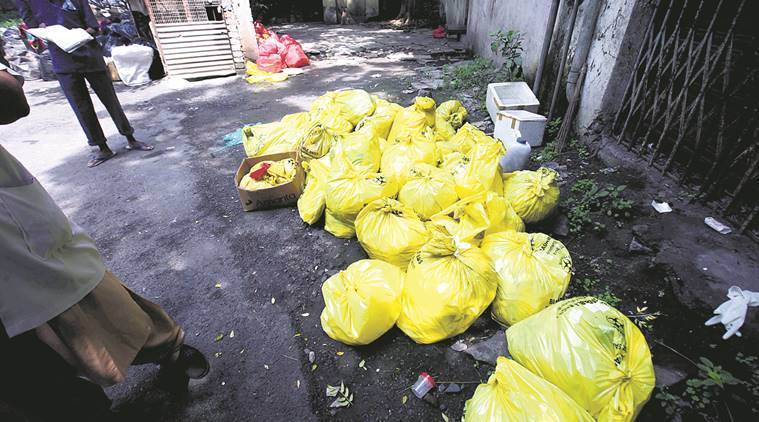With hostels, marriage halls and lodges being used as quarantine centres, numbering over 100 in Pune, the additional generation of contaminated solid waste had caused an overload at the common incineration facility at Kailash crematorium, Pune sole incineration facility.
For one-and-a-half months, the Covid-19 waste and other biomedical waste was being disposed of at treatment facilities at Taloja and Baramati. (Representational)
The latest guidelines issued by the Central Pollution Control Board (CPCB) on July 21 that left over food and general solid waste should not be mixed with biomedical waste generated at quarantine centres has provided some relief to the incineration facility at Kailash crematorium, which has been shut for the past one-and-a-half months but will now be functional by the end of the week.
The incineration facility was shut after parts of it were damaged due to the massive strain caused by processing Covid-19 biomedical waste. With hostels, marriage halls and lodges being used as quarantine centres, numbering over 100 in Pune, the additional generation of contaminated solid waste had caused an overload at the common incineration facility at Kailash crematorium, Pune sole incineration facility.
“The incinerator is designed to treat biomedical waste and so, its efficiency reduced when the load increased. Every day, we get 8,500-9,500 kg Covid-19 waste while non-Covid waste amounts to 2,500 to 3,000 kg per day,” said Sunil Dandavate, director of PASSCO Environmental Solutions, which is authorised by the PMC and PCMC to run the incineration facility.
For one-and-a-half months, the Covid-19 waste and other biomedical waste was being disposed of at treatment facilities at Taloja and Baramati.
On Tuesday, the Central Pollution Control Board made the fourth revision to the guidelines for handling, treating and disposing of waste generated during treatment/diagnosis and quarantine of Covid-19 patients. As per the revised guidelines, left over food and general solid waste from quarantine centres should be collected separately as per the Solid Waste Management Rules 2016.
Dandavate, who is the vice-president of the All India Common Bio-Medical Waste Treatment and Disposal Facility Operators, told The Indian Express that these guidelines will help reduce the load on the incinerator by at least 25 to 30 per cent. The total bio medical waste (both COVID and non-COVID) amounts to a daily approximate 10,000 kg.
Urban administrative bodies have been directed to inform the persons responsible for operating isolation wards, quarantine centres and residents of homecare units to collect solid waste and biomedical waste in securely tied separate bags and hand them over to authorised waste collectors. The leftover food and general solid waste should not be sent for disposal to the same incineration facility that is used for treating biomedical waste.
General solid waste comprises wrappers of medicines/syringes, fruit peel, empty juice bottles or tetra packs, used water bottles, discarded papers, carton boxes of medicines, empty bottles of disinfectants, left over food and disposable food plates.
According to Dandawate, the incinerator’s daily capacity of treatment and disposal is 4,000 kg of biomedical waste. Another 1,200 kg of the waste could be autoclaved, he said. “We have procured the exhaust gas stack (chimney) and other parts and now, the incinerator will be functional by the end of the week and initially process 4,000 kg of biomedical waste. The rest will be sent to facilities at Taloja and Baramati,” Dandavate said.
Source
https://indianexpress.com/article/cities/pune/cpcb-issues-revised-guidelines-leftover-food-general-solid-waste-at-quarantine-centres-to-be-disposed-as-per-swm-rules-2016-6517128/

Leftover food can be used to fill the stomach of needy people.
ReplyDelete